- Home
- James Hadley Chase
You Find Him, I'll Fix Him Page 4
You Find Him, I'll Fix Him Read online
Page 4
I was acutely aware that I had too many friends in Rome for my peace of mind. At any moment someone I knew might appear. I didn’t want tales to get back to Maxwell that instead of catching the eleven o’clock train to Venice, I had been seen boarding the noon train to Naples.
As I had ten minutes to wait, I went over to one of the benches, away in a corner and sat down. I read a newspaper, sheltering behind its open pages. Those ten minutes were fidgety ones. When I finally made .my way to the platform, I hadn’t as yet run into anyone I knew. I got a seat on the train with some difficulty, and settled down again behind my newspaper.
It was only when the train moved out of the station that I began to relax.
So far all was going well, I told myself. From now on I could consider myself safely launched on my vacation.
I still felt uneasy. I wished Helen hadn’t called up. I wished Gina hadn’t heard the name of Mrs. Douglas Sherrard. I wished I was strong-minded enough not to be so infatuated with this blonde, exciting girl. Now I knew a little about her past history, I realized she couldn’t be my type. A girl who fooled around with a man like Menotti just couldn’t be my type. I told myself this was just a physical thing. I was being a sensual, dumb fool to be infatuated with her.
All this reasoning didn’t get me anywhere. I knew if there was one thing I wanted more than anything else in the world, it was to spend a month in her company.
This was just another way of saying as far as Helen was concerned, I was a dead duck.
III
The local train arrived at Sorrento station twenty minutes late. The train was pretty crowded, and it was some minutes before I could work my way past the barrier and out into the station approach where a line of taxis and horse-drawn cabs waited to be hired.
I stood in the hot sunshine, looking around for Helen, but there was no sign of her. I put down my bag, waved away an eager beggar who wanted to conduct me to a taxi, and lit a cigarette.
I was surprised Helen wasn’t there to meet me, but, bearing in mind that the train was late, I thought she might have gone to look at the shops to pass the time. So I leaned against the
station wall and waited.
The crowd pouring out of the station slowly disappeared. Some were met by friends, some walked away, some hired taxis and carriages until I was the only one left. After perhaps fifteen minutes, and with still no sign of Helen, I began to get impatient.
Maybe she was sitting at some cafe in the piazza, I thought. I picked up my suitcase and carried it to the left luggage office, where I dumped h. Then, relieved of its weight, I wandered down the street to the centre of the town.
I walked around looking for Helen, but I couldn’t see her. I visited the car park, but I couldn’t see any car that could be Helen’s. I went over to one of the cafes, sat down at a table and ordered a cafe espresso.
From there I could watch the approach to the station and also see any car that arrived in the piazza.
The time was getting on for four-thirty. I drank the espresso, smoked three cigarettes, then, bored with waiting, I asked the waiter if I could use the telephone. I had a little trouble in getting the number of the villa, but after some delay the operator found the number and, after more delay, told me that no one was answering.
This was a let-down.
It was possible that Helen had forgotten the time the train arrived and had only just left the villa and was on her way down to the station. Containing my impatience, I ordered another espresso and sat down to wait, but by ten minutes after five, I was not only irritated, I was uneasy.
What had happened to her? I knew she had moved into the villa. Then why hadn’t she come down to meet me as we had arranged?
From the map she had shown me, I knew more or less where the villa was. At a rough guess it was five miles up-hill from Sorrento. I told myself I would be easier in mind doing something, rather than sitting at the cafe, so I decided to walk towards the villa in the hope that I would meet her as she drove down.
There was only one road to the villa so there was no chance of missing her. All I had to do was to follow the road, and sooner or later we must meet.
Without hurrying, I set off on the long walk towards the villa.
For the first mile I had to make my way through crowds of tourists who were shop-window gazing, waiting for buses and generally cluttering up the landscape, but once free of the town, and on the snake-back road that led eventually to Amalfi, I had only the fast traffic to contend with.
Two miles along this road brought me to the side road that would take me off the main road and up into the hills. The time was now twenty minutes past six, and there was still no sign of Helen.
I lengthened my stride and began the long, tortuous climb into the hills. After I had gone a mile, still without seeing any sign of Helen, I was sweating and anxious.
I saw the villa, perched on a high hill, overlooking the bay of Sorrento, a good half-hour before I reached it. It was as lovely and as exciting as Helen had said it was, but right then I wasn’t in the mood to appreciate its beauty. My one thought was to find Helen.
She had been right when she had said the villa was isolated. If anything, isolation was an under-statement. The villa stood in its own grounds, and there was no other house within sight.
I pushed open the wrought-iron gates and walked up the broad drive, bordered on either side by six-foot high dahlias, their heavy heads eight inches across, and of every colour in the book.
The drive opened out on to a tarmac on which stood Helen’s Lincoln convertible. Well, at least, I hadn’t missed her on the road, I thought, as soon as I saw the car.
I climbed the steps leading to the villa. The front door was ajar and I pushed it open.
“Helen! Are you there?”
The silence that came out of the house had a depressing effect on me. I walked into a large marble-floored hall.
“Helen!”
I went slowly from room to room. There was a large lounge with a dining-room alcove, a kitchen and a big patio that overlooked the sea, some two hundred feet below. Upstairs there were three bedrooms and two bathrooms. The villa was modern, well furnished and an ideal place for a vacation. I would have been thrilled with it if Helen had been there to greet me. As it was I only took time to assure myself that she wasn’t in the villa before going out into the garden and beginning to hunt for her there.
No answer came to my repeated calls and, by now, I was getting really rattled.
At the end of one of the garden paths I discovered a gate that stood ajar. Beyond the gate was a narrow path that led upwards to the top of the hill that rose above the villa. Could she have gone that way? I wondered. I decided I wasn’t going to sit around in the hope she would turn up. This path appeared to be the only other exit from the villa. I knew I couldn’t have missed her on the walk up from Sorrento. There was a chance she had gone for a walk along this path and had either forgotten the time or had met with some kind of an accident.
I hurried back to the villa to leave a note in case she happened to be still in Sorrento and I had somehow missed her. I didn’t want her to go rushing back to Sorrento if she returned from there, and not find me at the villa.
I found some beaded notepaper in one of the drawers in the desk and scribbled a brief note, which I left on the table of the lounge; then I left the villa and walked fast along the garden path-to the gate.
I had walked for perhaps a quarter of a mile and was beginning to think that Helen couldn’t have possibly come this way when I saw below me, built into the hill face, a big white villa. It was in the most inaccessible place I have ever seen for a house to be built in. There was only a flight of steep steps leading from the cliff head down to the villa. The only practical way of reaching the place was by sea. I wasn’t interested in the villa and I didn’t even pause, but I looked at it as I continued my way along the winding path. I could see a big terrace with a table, lounging chairs and a big red umbrella. Down a flight of ste
ps, I could see a harbour in which were moored two powerful motor-boats. As I Walked on, I wondered who the millionaire could be who owned such a place. I hadn’t walked more than three hundred yards before the villa was completely blotted out of my mind, for lying directly in my path was Helen’s camera case.
I recognized it immediately and I stopped short, my heart skipping a beat.
For a long moment I stared at it; then, moving forward, I stooped to pick it up. There was no doubt that it was hers. Apart from the shape and the newness of the pigskin leather, there were her initials on the cover flap in gold. The case was empty.
Holding the case in my hand, I hurried on. Another fifty yards further on the path suddenly twisted at right angles, and cut away inland into a thick wood that covered the last quarter of a mile to the top of the hill.
The right-angle bend in the path brought the path dangerously close to the overhang and, pausing there, I looked down the sheer hillside at the sea that lapped against the massive boulders some two hundred feet below.
I drew in my breath sharply as I caught sight of something white that lay, half-submerged in the sea and was sprawled out like a broken doll on the rocks.
I stood transfixed, peering down, my heart thudding, my mouth dry.
I could see the long blonde hair floating gently in the sea. The full skirt of the white frock billowed out as the sea swirled around the broken body. There was no need to make wild guesses. I knew the dead woman down there was Helen.
PART THREE
I
She had to be dead.
She couldn’t have survived that fall nor lie the way she was lying, with the sea covering her head, and not be dead, but I just couldn’t believe it.
“Helen!”
There was a cracked note in my voice as I yelled down to her.
“Helen!!”
My voice echoed back to me: a ghostly sound that set me shaking.
She couldn’t be dead, I told myself. I had to make sure. I couldn’t leave her there. She might be drowning even as I stared down at her.
I threw myself flat and edged forward until my head and shoulders were clear of the overhang. The height made me dizzy. From this point of view the drop was horrifying.
I looked feverishly along and down the chalk face to find some way that would take me down to her, but there was no way. It would be like trying to climb down the face of a monstrous wall. The only way to get down there would be to be lowered by a rope.
My heart was hammering, and there was cold sweat on my face as I edged forward a few more dangerous inches.
From this position I could see her more clearly. I could see that her face and head were completely submerged by the gently lapping sea, and as a shaft of light from the sinking sun lit up the sea, I saw there was a halo of red around her blonde hair.
She was dead all right.
I worked my way back on to the path and squatted on my heels, sick and shaking. I wondered how long she had been lying down there. She might have been dead for hours.
I had to get help. There would be a telephone in the villa. I’d call the police from there. If I
hurried, they might be able reach her before it became too dark to find her.
I stood up, took two uncertain, unsteady steps backward and came to an abrupt stop.
The police!
I suddenly realized what a police investigation would mean to me. It wouldn’t take them long to find out that Helen and I had planned to spend a month in the villa. It would only take a little longer for the news to reach Chalmers. Once I called in the police the whole sordid story would come out.
As I stood hesitating, I saw a fishing boat come slowly into the little bay below me. I immediately became aware that I was sharply silhouetted against the sky line. Although the crew down there were too far away to see my features, a wave of panic sent me down on my hands and knees out of sight.
This was it. I was in a hell of a jam. I had known all along at the back of my mind that I was walking into trouble by getting infatuated with Helen, and now I had walked into it.
As I crouched down, I imagined the expression that would come on Sherwin Chalmers’s heavy, tough face when he heard the news that his daughter and I had arranged to stay at a villa in Sorrento, and his daughter had fallen over a cliff.
He would be certain we had been lovers. He might even think I had got tired of her and had pushed her off the cliff.
This thought shook me.
There was a possibility that the police might think that too. So far as I knew, no one had seen her fall. I couldn’t prove the exact time I had arrived here. I had come out of the crowded train, just one among a hundred other travellers. I had left my suitcase with the station clerk, but he saw different faces every hour of the day, and it wasn’t likely he would remember me. There was no one else. I couldn’t recall meeting anyone on the long walk up from Sorrento. No one anyway who would be likely to swear to the exact time I had arrived on the cliff head.
A lot depended, of course, on the time when Helen died. If she had fallen within an hour or so of my arrival, and if the police suspected that I had pushed her over the cliff, then I would really be in a bad position.
By now I had worked myself into quite a state of nerves. My one thought was to get as far away from here as I could without being seen. As I turned to make my way down the path, I
stumbled over Helen’s camera case that I had dropped when I had caught sight of her.
I picked it up, hesitated, then made to heave it over the cliff, but stopped in time.
I couldn’t afford to make a single mistake now. My fingerprints were on the case.
I took out my handkerchief and wiped the case over carefully. I went over the case four or five times until I was satisfied I hadn’t left a trace of any prints. Then I tossed the case over the cliff.
Turning, I moved swiftly back down the path.
By now the light was fading. The sun, a great fiery ball, drenched the sky and sea in a red glow. In another half-hour it would be dark.
I kept on, barely glancing at the lone white villa I had seen on my way up, but noticing that lights were showing at three or four of the windows.
My panic subsided a little as I continued to hurry along the path. I felt bad about leaving Helen, but I was certain she was dead, and I told myself I had to think of myself.
By the time I reached the garden gate, I had got over the first shock of her death and my mind was functioning again.
I knew the right thing to do was to call the police. I told myself that if I made a clean breast of it, admitted I was going to live with the girl for a month, and explained how I had come upon her body, there was no reason why they shouldn’t believe me. At least, they couldn’t catch me out in a lie. But if I kept quiet, and by some unlucky chance they got on to me, they would be justified in suspecting that I was responsible for her death.
This reasoning would have convinced me if it were not for the new job: I wanted to run the foreign desk more than I wanted anything else in this world. I knew I wouldn’t get the job if Chalmers learned the truth. I would be mad to throw away my future by telling the police the truth: that way I had everything to lose. If I kept quiet, and had some luck, there was a good chance I would get away with it.
It wasn’t as if there had been anything between us, I told myself. I wasn’t even in love with the girl. It had been a stupid, irresponsible impulse. She had been more to blame than I. She had encouraged me. She had arranged everything. According to Maxwell, she was a practised siren. She had a reputation for making trouble for men. I’d be a fool not to try and save myself. Having got all that off my chest, I calmed down-Okay, I thought, I’ve got to make certain no
one ever knows I’ve been here. I’ve got to establish an alibi for myself.
By now I had reached the gate that led through the garden to the villa. I paused there to look at my watch. The time was half-past eight. Maxwell and Gina believed right now that I was in Veni
ce. There wasn’t a hope of getting from here to Venice to-night. My only chance to establish an alibi was to get back to Rome. With any luck, I could get there by about three in the morning. I would go to the office early the following morning, and make out I had changed my mind about going to Venice and, instead, had stayed in Rome to finish a chapter of a novel I was writing.
It wasn’t much of an alibi, but it was the best I could think of at the moment. The point was that it would be easy for the police to prove that I hadn’t been to Venice, but impossible for them to prove that I hadn’t spent all day in my pent house apartment. I had a private stairway to the apartment and no one ever saw me enter or leave.
If only I had brought my car! It would have been simple to get to Rome if I had the car. I didn’t dare take the Lincoln convertible which I could see as I rounded the bend in the garden path.
The village woman whom Helen had hired to run the villa was certain to know Helen had brought the car. If it were missing, the police might jump to the conclusion that Helen’s death hadn’t been accidental.
I would have to walk to Sorrento, and then try for a train to Naples. I had no idea what time the last train left Sorrento for Naples, but I thought it more than likely that by the time I had covered the five long miles on foot, the last train would have gone. I knew there was an elevenfifteen from Naples to Rome, but I had still to get to Naples. Once again I looked at the Lincoln convertible. I fought down the temptation to take it. Whatever I did, I must not complicate this set-up more than it was already.
As I moved around the car and towards the drive, I looked back at the dark, silent villa and I got a shock.
Had I imagined the flash of light that had appeared from within the lounge?
Moving quickly and silently, my heart hammering, I crouched down behind the car.
I stared at the lounge windows for a long moment, then I saw again the gleam of white light which immediately disappeared.

 Come Easy, Go Easy
Come Easy, Go Easy Why Pick On ME?
Why Pick On ME?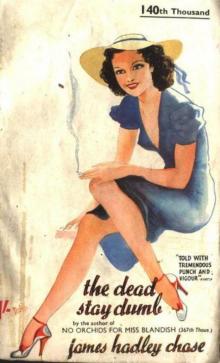 The Dead Stay Dumb
The Dead Stay Dumb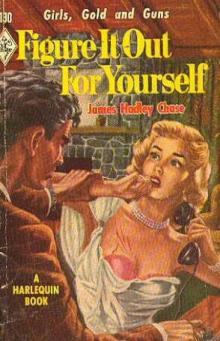 Figure it Out For Yourself
Figure it Out For Yourself 1944 - Just the Way It Is
1944 - Just the Way It Is No Business Of Mine
No Business Of Mine 1953 - The Sucker Punch
1953 - The Sucker Punch Cade
Cade 1973 - Have a Change of Scene
1973 - Have a Change of Scene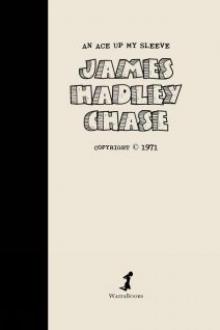 An Ace up my Sleeve
An Ace up my Sleeve 1968-An Ear to the Ground
1968-An Ear to the Ground 1950 - Figure it Out for Yourself
1950 - Figure it Out for Yourself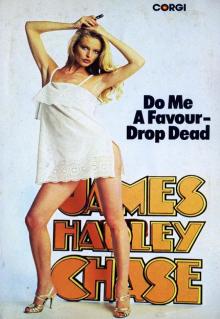 1976 - Do Me a Favour Drop Dead
1976 - Do Me a Favour Drop Dead The Flesh of The Orchid
The Flesh of The Orchid 1974 - Goldfish Have No Hiding Place
1974 - Goldfish Have No Hiding Place Whiff of Money
Whiff of Money 1984 - Hit Them Where it Hurts
1984 - Hit Them Where it Hurts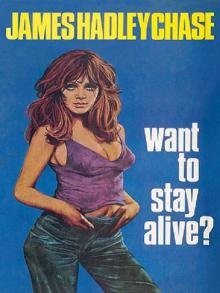 1971 - Want to Stay Alive
1971 - Want to Stay Alive 1980 - You Can Say That Again
1980 - You Can Say That Again 1978 - Consider Yourself Dead
1978 - Consider Yourself Dead The Paw in The Bottle
The Paw in The Bottle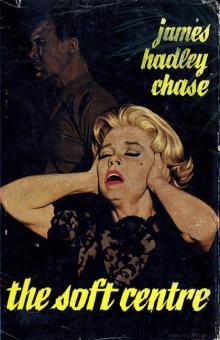 Soft Centre
Soft Centre The Guilty Are Afraid
The Guilty Are Afraid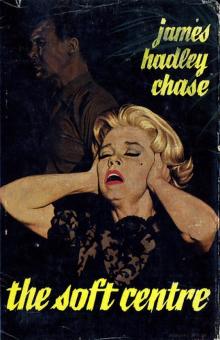 The Soft Centre
The Soft Centre Have a Nice Night
Have a Nice Night 1957 - The Guilty Are Afraid
1957 - The Guilty Are Afraid 1979 - You Must Be Kidding
1979 - You Must Be Kidding Knock, Knock! Who's There?
Knock, Knock! Who's There?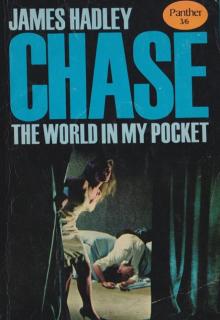 1958 - The World in My Pocket
1958 - The World in My Pocket Get a Load of This
Get a Load of This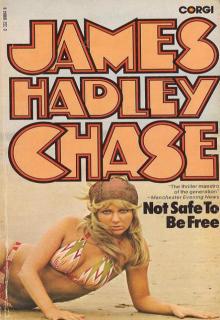 1958 - Not Safe to be Free
1958 - Not Safe to be Free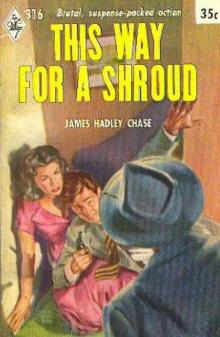 This Way for a Shroud
This Way for a Shroud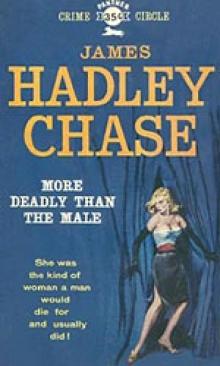 More Deadly Than the Male
More Deadly Than the Male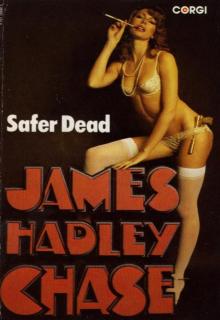 Safer Dead
Safer Dead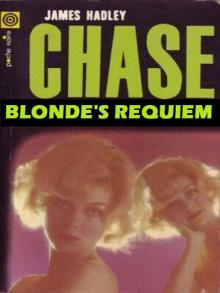 1945 - Blonde's Requiem
1945 - Blonde's Requiem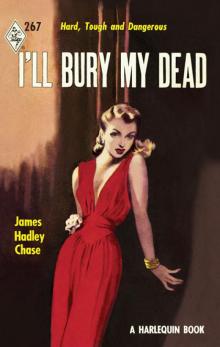 I'll Bury My Dead
I'll Bury My Dead 1975 - The Joker in the Pack
1975 - The Joker in the Pack 1972 - Just a Matter of Time
1972 - Just a Matter of Time 1954 - Mission to Venice
1954 - Mission to Venice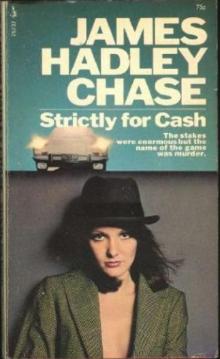 Strictly for Cash
Strictly for Cash A COFFIN FROM HONG KONG
A COFFIN FROM HONG KONG Lady—Here's Your Wreath
Lady—Here's Your Wreath I Would Rather Stay Poor
I Would Rather Stay Poor Eve
Eve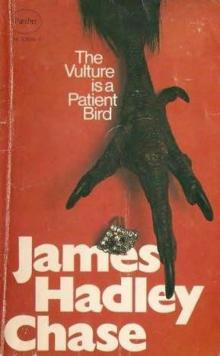 Vulture Is a Patient Bird
Vulture Is a Patient Bird 1979 - A Can of Worms
1979 - A Can of Worms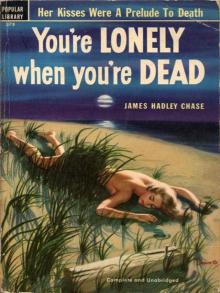 1949 - You're Lonely When You Dead
1949 - You're Lonely When You Dead 1965 - This is for Real
1965 - This is for Real (1941) Miss Callaghan Comes To Grief
(1941) Miss Callaghan Comes To Grief What`s Better Than Money
What`s Better Than Money This is For Real
This is For Real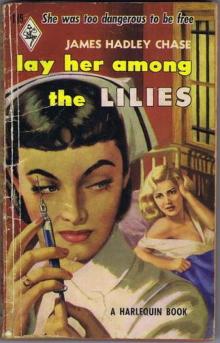 Lay Her Among the Lilies vm-2
Lay Her Among the Lilies vm-2 Knock Knock Whos There
Knock Knock Whos There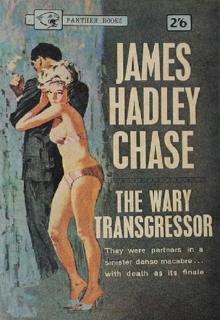 1952 - The Wary Transgressor
1952 - The Wary Transgressor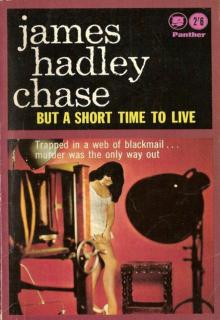 1951 - But a Short Time to Live
1951 - But a Short Time to Live 1962 - A Coffin From Hong Kong
1962 - A Coffin From Hong Kong Tell It to the Birds
Tell It to the Birds Well Now, My Pretty…
Well Now, My Pretty…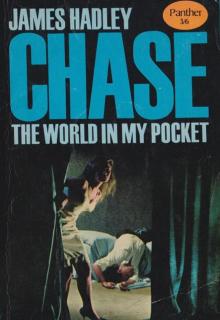 The World in My Pocket
The World in My Pocket A Lotus for Miss Quon
A Lotus for Miss Quon You Find Him, I'll Fix Him
You Find Him, I'll Fix Him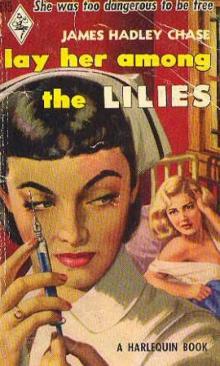 Lay Her Among The Lilies
Lay Her Among The Lilies 1951 - In a Vain Shadow
1951 - In a Vain Shadow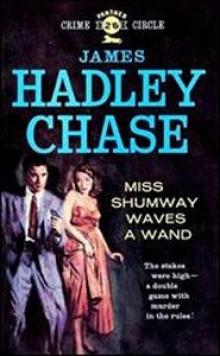 Miss Shumway Waves a Wand
Miss Shumway Waves a Wand 1953 - This Way for a Shroud
1953 - This Way for a Shroud 1964 - The Soft Centre
1964 - The Soft Centre You Can Say That Again
You Can Say That Again 1975 - Believe This You'll Believe Anything
1975 - Believe This You'll Believe Anything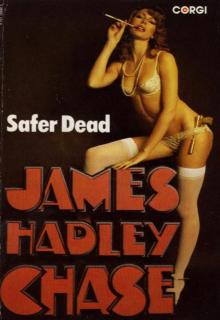 1954 - Safer Dead
1954 - Safer Dead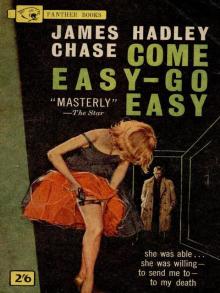 1960 - Come Easy, Go Easy
1960 - Come Easy, Go Easy Shock Treatment
Shock Treatment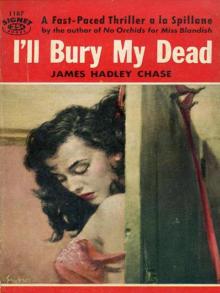 1953 - I'll Bury My Dead
1953 - I'll Bury My Dead You Find Him – I'll Fix Him
You Find Him – I'll Fix Him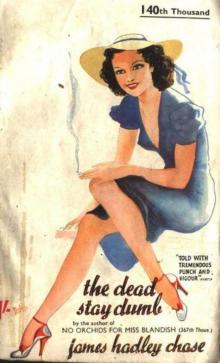 Dead Stay Dumb
Dead Stay Dumb Just Another Sucker
Just Another Sucker Well Now My Pretty
Well Now My Pretty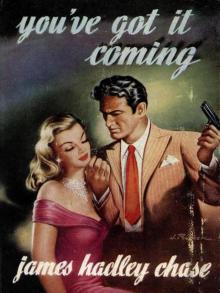 You've Got It Coming
You've Got It Coming 1972 - You're Dead Without Money
1972 - You're Dead Without Money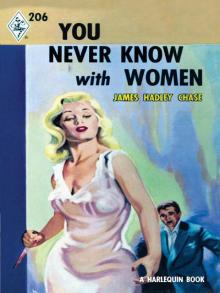 1955 - You Never Know With Women
1955 - You Never Know With Women Not My Thing
Not My Thing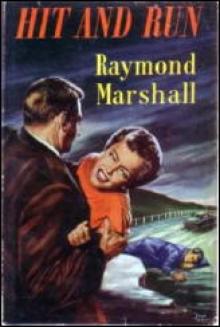 Hit and Run
Hit and Run 1971 - An Ace Up My Sleeve
1971 - An Ace Up My Sleeve 1970 - There's a Hippie on the Highway
1970 - There's a Hippie on the Highway 1968 - An Ear to the Ground
1968 - An Ear to the Ground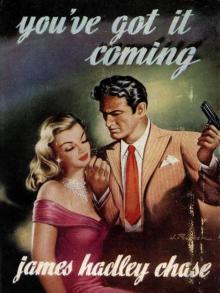 1955 - You've Got It Coming
1955 - You've Got It Coming 1963 - One Bright Summer Morning
1963 - One Bright Summer Morning 1967 - Have This One on Me
1967 - Have This One on Me He Won't Need It Now
He Won't Need It Now 1953 - The Things Men Do
1953 - The Things Men Do Believed Violent
Believed Violent You Never Know With Women
You Never Know With Women Miss Callaghan Comes to Grief
Miss Callaghan Comes to Grief Mission to Siena
Mission to Siena What's Better Than Money
What's Better Than Money Trusted Like The Fox
Trusted Like The Fox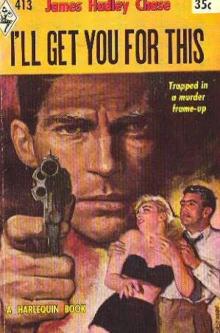 I'll Get You for This
I'll Get You for This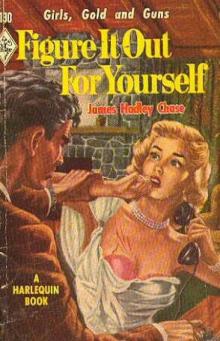 Figure It Out for Yourself vm-3
Figure It Out for Yourself vm-3 Like a Hole in the Head
Like a Hole in the Head 1977 - I Hold the Four Aces
1977 - I Hold the Four Aces 1969 - The Whiff of Money
1969 - The Whiff of Money 1946 - More Deadly than the Male
1946 - More Deadly than the Male 1956 - There's Always a Price Tag
1956 - There's Always a Price Tag No Orchids for Miss Blandish
No Orchids for Miss Blandish 1977 - My Laugh Comes Last
1977 - My Laugh Comes Last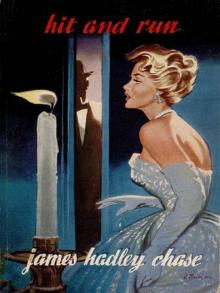 1958 - Hit and Run
1958 - Hit and Run 1981 - Hand Me a Fig Leaf
1981 - Hand Me a Fig Leaf 1966 - You Have Yourself a Deal
1966 - You Have Yourself a Deal Tiger by the Tail
Tiger by the Tail